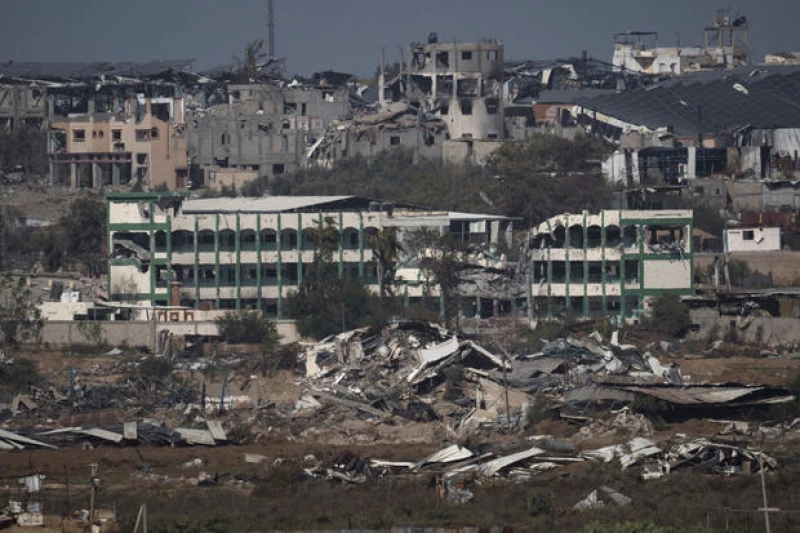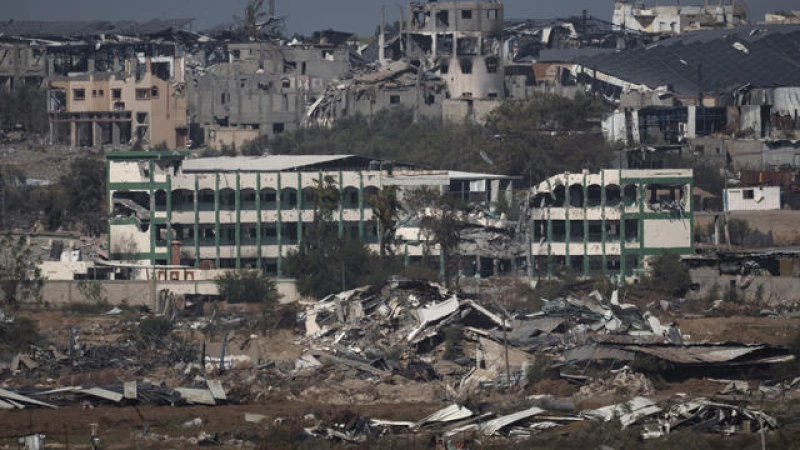According to rescuers and hospital officials, over 90 Palestinians, including many from a large family, lost their lives in Israeli airstrikes targeting two homes. This comes in the wake of the U.N. chief's recent warning that nowhere is safe in Gaza, and that Israel's ongoing offensive is hindering the distribution of humanitarian aid.
In a separate development, the Israeli military announced that hundreds of alleged militants in Gaza have been arrested over the past week. More than 200 of them have been transferred to Israel for further interrogation, shedding light on the controversial policy of mass roundups of Palestinian men. So far, over 700 individuals with alleged ties to Hamas and Islamic Jihad have been sent to Israeli lockups.
Israel initiated the war after Hamas gunmen crossed the border on October 7th, resulting in the death of approximately 1,200 people and the hostage-taking of around 240 individuals. Health officials in Gaza, a besieged territory under the rule of the Islamic militant group for the past 16 years, report that over 20,000 Palestinians have been killed and more than 53,000 have been injured in Israel's campaign to dismantle Hamas.
Israel Vows to Continue Fighting Until Hamas is Destroyed
Despite mounting international calls for a cease-fire, Israel has vowed to keep up the fight until Hamas is destroyed and removed from power in Gaza and all the hostages are freed. The Biden administration has shielded Israel in the diplomatic arena. On Friday, the U.N. Security Council adopted a watered-down resolution that calls for immediately speeding up aid deliveries to desperate civilians in Gaza, but not for a cease-fire.
On Friday, airstrikes flattened two homes, one in Gaza City and the other in the urban refugee camp of Nuseirat in the center of the territory.
The Gaza City strike killed 76 people from the al-Mughrabi family, making it one of the deadliest of the war, said Mahmoud Bassal, a spokesman for Gaza's Civil Defense department. He provided the names of 16 heads of households within the family, and said the dead included women and children.
Among those killed were Issam al-Mughrabi, a veteran employee of U.N. Development Program, his wife, and their five children.
"The loss of Issam and his family has deeply affected us all. The U.N. and civilians in Gaza are not a target," said Achim Steiner, the head of the agency. "This war must end."
Later Friday, a strike pulverized the Nuseirat home of Mohammed Khalifa, a local TV journalist, killing him and at least 14 others, according to officials at the nearby Al Aqsa Martyrs' Hospital where the bodies were taken. Mourners held funeral prayers Saturday in the hospital's courtyard while rescue teams continued to search for survivors. The legs of at least two bodies were seen under what appeared to be a collapsed roof.
Israel Blames Hamas for Civilian Death Toll
Israel has accused Hamas of being responsible for the high civilian death toll in Gaza. The Israeli government claims that Hamas militants are using residential areas and tunnels to carry out their attacks. Since October 7th, Israel has launched numerous airstrikes, but has refrained from commenting on specific targets.
The Israeli offensive has been extremely destructive, displacing nearly 85% of Gaza's 2.3 million people and causing widespread devastation. According to the United Nations and other agencies, more than half a million people in Gaza, which accounts for a quarter of the population, are now starving.
Rear Admiral Daniel Hagari, the military spokesman, announced on Friday that the ground offensive in Gaza is being expanded to additional areas of the strip, with a focus on the south. He also stated that operations are continuing in the northern half of Gaza, which was the initial target of the ground offensive. The Israeli army has carried out airstrikes against Hamas fighters in various locations in Gaza City.
The military has denied allegations of abuse and claims that individuals without any links to militants are promptly released.
Israel claims to have eliminated numerous Hamas militants, with around 2,000 being killed in the last three weeks. However, no evidence has been presented to support these claims. The Israeli government also states that 139 of its soldiers have died during the ground offensive.

Following the U.N. resolution, it remains unclear how and when aid deliveries will be expedited. Currently, trucks can enter Gaza through two crossings: Rafah on the border with Egypt and Kerem Shalom on the border with Israel. However, both crossings were closed on Saturday due to an agreement between Israel, Egypt, and the United Nations.
Prior to the Security Council vote, the United States negotiated the removal of language that would have granted the U.N. the authority to inspect aid entering Gaza. Israel insists on maintaining this control to prevent materials from reaching Hamas.
U.N. Secretary-General Antonio Guterres expressed his belief that the effectiveness of the humanitarian operation should not be measured solely by the number of trucks. He highlighted the significant obstacles created by Israel's conduct of the offensive, including the lack of security, staff safety, logistical capacity (especially trucks), and the resumption of commercial activity.
"The real problem is that the way Israel is conducting this offensive is creating massive obstacles to the distribution of humanitarian aid inside Gaza," he said. He emphasized the need for security, safe working conditions for staff, sufficient logistical capacity (especially trucks), and the resumption of commercial activity in order to facilitate an effective aid operation.
Guterres reiterated his longstanding call for a humanitarian cease-fire. He expressed hope that the resolution may help this happen but said "much more is needed immediately" to end the ongoing "nightmare" for the people in Gaza.
The United States had won the removal of a tougher call for an "urgent suspension of hostilities" between Israel and Hamas. It abstained in the vote, as did Russia, which wanted the stronger language.
Israel's ambassador to the U.N., Gilad Erdan, sharply criticized the U.N. for its failure to condemn Hamas' Oct. 7 attacks. The U.S. vetoed a resolution in October that would have included a condemnation because it didn't also underline Israel's right to self-defense.
Hamas said the U.N. resolution should have demanded an immediate halt to Israel's offensive, and it blamed the United States for pushing "to empty the resolution of its essence" before Friday's Security Council vote







